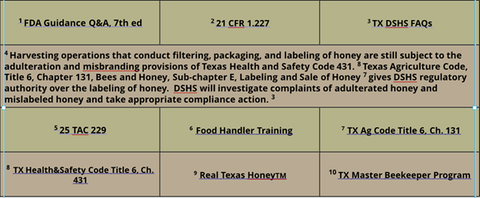Options for Selling Honey in Texas
Part One

By: Lynne Jones
It is said, “If you ask twelve beekeepers a question, you’ll get at least 13 different answers.” Unfortunately, this applies to the question of selling honey as well. In this two-part article, I’ll try to explain the different options for selling honey in Texas, starting with what most beekeepers operated under – “Small Honey Producer.” Notice I said, “operated,” using past-tense, because last summer everything changed.
In August 2018, the Food and Drug Administration (FDA) published a 61-page document,Questions and Answers Regarding Food Facility Registration (Seventh Edition): Guidance for Industry 1. The document includes two questions/answers regarding honey, one of which established, “Many activities associated with beekeeping and honey production are within the “farm” definition….” What does this mean? It means according to the FDA, the rules that apply to a farm 2 should also apply to beekeepers when they extract, package, and label raw agricultural commodities (RAC) for both retail and wholesale.
Though it took Texas a while to address this guidance, on July 16, 2020, the Texas Department of State Health Services posted an update to their Frequently Asked Questions - Food Manufacturers, Wholesalers, and Warehouses page 3, that for all practical purposes, makes the licensing exemption for “Small Honey Producer” irrelevant.
There are still rules 4, but not nearly as many as there were before. Now as a beekeeper, you can sell raw honey produced from your own bees/hives and do not need a license to bottle and sell, whether for retail or wholesale. Based on the research I’ve done, I have outlined and condensed the requirements for “Beekeeper Honey Production” here:
Honey Requirements:
- It must be pure raw honey from your bees/hives
- Activities that ARE permitted are:
-Harvesting (uncapping, extracting, straining/filtering liquid honey and cutting comb honey)
-Packing or holding RAC (store in barrels, buckets, or any container not for the consumer)
-Packaging (putting into containers for sale to the consumer) and Labeling -Drying/dehydrating honey
- Blending other raw honey with your honey.
- Manufacturing/processing operations are not allowed. Operations that are NOT permitted are:
-Using heat to pasteurize
-Whipping in air to make whipped honey (Which isn’t how creamed/whipped honey is actually made, but that’s a subject for another article.)
-Adding/infusing anything to the honey (spice, flavoring, ‘extra’ pollen)
Location(s) for harvesting, packing/holding, packaging and labeling:
- At the “primary production farm” 5 (any location or building on the property where you have your apiary/apiaries).
- At the “secondary activities farm” 5 (operation, not located on a primary production farm, devoted to any of the approved operations listed above. You must own, or jointly own, a majority interest in the secondary activities farm operation – you don’t have to own the property, just the “operation.” This means you can extract/bottle/store, etc. the honey away from your apiary. For example, your apiary in the country is the primary production farm and your home where you extract/bottle/store is your secondary activities farm.
- You do not need a honey house or facility inspected by the TX Dept. of State Health Services.
- You do not need a license or to register with the State or any other government agency (as long activities stay within the “allowable farm activities”). Food Handler certificate is recommended, but not required.


Requirements for Sales:
- Limited to sales within Texas
- No annual $ limit, no In-person requirement, no direct-to-the-consumer requirement
- Anyone associated with the “farm” can sell the honey (Small Honey Producer regs. limited sellers to the beekeeper and immediate family members.)
Requirements for Labeling:
- If your label uses the words "honey," "liquid honey," "extracted honey," "strained honey," or "pure honey" to identify the product, it must be 100% pure honey.7
- If your label uses a picture or drawing of a bee, hive, or comb it can only be used on containers of 100% pure honey.7 (Something to consider if you sell, or plan to sell infused or flavored honey under Cottage Food Production Operations which will be covered in Part 2)
- Violating the labeling requirements above is a Class B misdemeanor
- Chapter 431 Sec. 431.082(f)(1) standard required labeling 8: name of the product net weight statement name and address of business/beekeeper
- A voluntary warning statement is recommended due to the chance that an infant could contract Infant Botulism after ingesting honey. The statement commonly used is the following: “Do not feed honey to infants under one year of age.”
- The following statement is no longer required: “Bottled or packaged in a facility not inspected by the Texas Department of State Health Services.”
- Nutrition Information if your annual business sales to consumers are more than $500,000 or your annual food sales to consumers are more than $50,000.[Sec.431.082(q)(1) and (3)(D)]
In summary, you can now sell pure raw honey in-person, by mail, phone, and on-line from any location you choose. You can sell pure raw honey direct to the consumer as before, but now also to stores, restaurants, gift shops, or any other retail or wholesale business in Texas. Also, you do not need to bottle in an inspected facility, nor do you need a Food Manufacturer license. Next month I will cover what can be sold, and the requirements for selling as “Cottage Food Operator” and “Licensed Food Manufacturer.”
Disclaimer: I am not an attorney and my opinions should not be considered legal advice. Conduct your own research or consult an attorney
Citation Legend - Each citation linked



Lynne Jones is a 5-year beekeeper and owner of Brazos River Honey. She serves as the Secretary-Treasurer of the Fort Bend Beekeepers Association and is a member of the Harris County Beekeepers Association, and the Texas Beekeepers Association. She is an original member of the Real Texas Honey TM program and is currently at the Advanced level of the Texas Master Beekeeper program.

